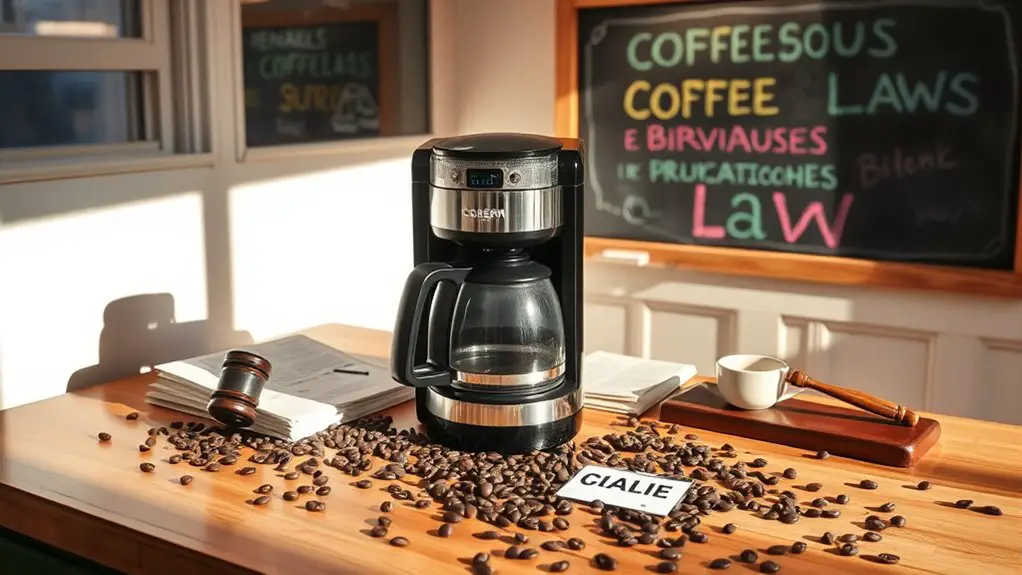You might be surprised to learn that coffee makers are subject to quirky regulations. For instance, Italy bans certain espresso machines to protect traditional brewing methods, while Denmark restricts imports for environmental reasons. Some states in the U.S. have unique taxes on coffee makers and caffeine production, like New York's Coffee Maker Tax. Plus, local regulations can dictate the safety and design of your favorite brewers. There's much more to uncover about these intriguing laws!
The Great Bean Debate: What Coffee Beans Are Allowed?
When it comes to brewing the perfect cup of joe, the type of coffee beans you can use might surprise you. The origins of your beans can greatly influence flavor, aroma, and overall experience. Whether you choose beans from Ethiopia, Colombia, or even Indonesia, each origin brings its unique profile to your cup. However, you should be aware of the roasting regulations in your area, which can dictate how beans are processed and sold. Some regions impose strict guidelines to guarantee quality and safety, impacting the variety available to you. Embrace the freedom to explore diverse bean origins, but always check local regulations. After all, the journey to that ideal brew starts with the beans you choose!
Brewing Restrictions: Regulations on Coffee Maker Designs
Although you might think of coffee makers as simple appliances, various regulations can dictate their design and functionality. These brewing restrictions, often overlooked, guarantee that your beloved coffee maker meets specific design specifications and safety standards. For instance, manufacturers must comply with guidelines that prevent overheating, guaranteeing your morning brew doesn't turn into a fire hazard. Some regions even have rules about materials used in construction, promoting non-toxic components for healthier brews. While you might crave the freedom to customize your coffee experience, these regulations ultimately protect you. So, next time you brew, remember that those seemingly mundane designs are backed by laws that prioritize your safety and satisfaction, allowing you to enjoy your coffee with peace of mind.
The Tax on Caffeine: Unusual Coffee Maker Tax Laws
While you might enjoy your morning coffee ritual, you may be surprised to learn that some regions impose taxes on coffee makers and the caffeine they produce. These unusual taxes can create unexpected tax implications, making your caffeine fix more expensive than you thought. Here's a glimpse into some caffeine regulations you might not know about:
| Region | Tax Type |
|---|---|
| New York | Coffee Maker Tax |
| California | Caffeine Excise Tax |
| Texas | Brew Tax |
| Illinois | Specialty Coffee Tax |
| Florida | Instant Coffee Tax |
Understanding these quirky laws can help you navigate your coffee journey with more freedom. So, next time you brew, remember that taxes may be lurking in your cup!
Licensing to Brew: Permits Required for Coffee Shops
Steering through the world of coffee isn't just about picking the right beans or mastering the perfect brew; it also involves understanding the legal landscape if you're planning to open a coffee shop. Before you start pouring lattes, you'll need to secure the right business licensing. This often varies by location, so you'll want to check with your local authorities to verify you're compliant. Don't forget about health permits, too! They guarantee your shop meets safety and sanitation standards, which is vital for keeping your customers happy and healthy. Maneuvering through these requirements can feel overwhelming, but it's all part of creating a welcoming space for fellow coffee lovers. With the right permits, you'll be free to share your passion for coffee with the world!
International Coffee Maker Bans: Countries With Surprising Prohibitions
Have you ever wondered which countries might ban the beloved coffee maker? It might surprise you to learn that some nations impose restrictions on coffee maker imports due to strict international brewing regulations. These bans can stem from environmental concerns or health issues. Here's a quick look at some surprising prohibitions:
| Country | Reason for Ban | Year Implemented |
|---|---|---|
| Italy | Protect traditional espresso methods | 2015 |
| Denmark | Environmental impact of appliances | 2020 |
| Bhutan | Focus on reducing waste | 2018 |
| Saudi Arabia | Cultural preferences | 2019 |
| Venezuela | Economic restrictions on imports | 2021 |
Understanding these bans not only enlightens you about global coffee culture but also emphasizes the importance of sustainable brewing practices.
Frequently Asked Questions
Are There Age Restrictions for Buying Coffee Makers?
Imagine a bustling marketplace, where age verification isn't usually a concern. For coffee makers, though, you'll find no purchase restrictions based on age. Feel free to brew your favorite blend without any worries!
Can I Use a Coffee Maker for Non-Coffee Beverages?
Absolutely, you can use your coffee maker for beverage versatility! It's perfect for brewing tea, hot chocolate, or even soups. Just explore those alternative uses, and you'll reveal a whole new world of delicious possibilities!
What Happens if I Break a Coffee Maker Law?
If you break a coffee maker law, you might face legal consequences. These can include hefty coffee maker fines, which could put a damper on your brewing freedom. Stay informed to avoid unnecessary penalties!
Are There Safety Standards for Home Coffee Makers?
Yes, there're safety standards for home coffee makers. Manufacturers must meet safety regulations and certification requirements to guarantee your device operates safely and efficiently, giving you peace of mind while you enjoy your daily brew.
How Do Coffee Maker Laws Vary by State?
Coffee maker laws vary by state, reflecting differing state regulations and consumer safety standards. Some states prioritize energy efficiency, while others focus on materials used in coffee equipment. Knowing these can enhance your brewing freedom.
